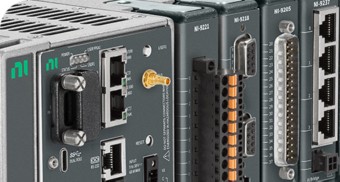LabVIEW Core 2 Course Overview
The LabVIEW Core 2 Course is an extension of the LabVIEW Core 1 Course. This course teaches you how to use common design patterns to successfully implement and distribute LabVIEW applications for research, engineering, and testing environments. Topics covered include programmatically respond to user interface events, implementing parallel loops, manage configuration settings in configuration files, develop an error handling strategy for your application, and tools to create executables and installers. The LabVIEW Core 2 Course directly links LabVIEW functionality to your application needs and provides a jump-start for application development.
Available Formats
Course Objectives
-
Implement multiple parallel loops and transfer data between the loops
-
Create an application that responds to user interface events
-
Manage configuration settings for your application
-
Develop an error handling strategy for your application
-
Package and distribute LV code for reuse
-
Identify Best Programming Practices for use in LabVIEW
Course Details
Duration
-
Instructor-led Classroom: Two (2) days
-
Instructor-led Virtual: Three (3) days, five-and-a-half-hour sessions
-
On-Demand: 4 hours (exercises as a supplement)
Audience
-
New users and users preparing to develop applications using LabVIEW
-
LabVIEW Core 1 Course attendees
-
Users and technical managers evaluating LabVIEW in purchasing decisions
-
Users pursuing the Certified LabVIEW Associate Developer certification
Prerequisites
-
LabVIEW Core 1 Course or equivalent experience
NI Products Used
If you take the course On-Demand:
-
LabVIEW 2021
-
NI-DAQmx 21.0
-
NI PCI-6221 or NI USB-6212, BNC-2120
-
Simulated NI-PCI-6221
If you take the course in an instructor-led format:
-
LabVIEW Professional Development System 2023 or later
-
NI-DAQmx 23.0 or later
-
USB-6212
-
BNC-2120
Training Materials
-
Virtual instructor-led training includes digital course material that is delivered through the NI Learning Center
-
NI virtual instructor-led training is delivered through Zoom, and Amazon AppStream/LogMein access is provided to participants to perform the exercises on virtual machines equipped with the latest software
Cost in Credits
-
On-Demand: Included with software subscription and enterprise agreements, or 5 Education Services Credits, or 2 Training Credits
-
Public virtual or classroom course: 20 Education Services Credits or 6 Training Credits
-
Private virtual or classroom: 140 Education Services Credits or 40 Training Credits
LabVIEW Core 2 Course Outline
| Lesson | Overview | Topics |
|---|---|---|
Transferring Data | Use channel wires to communicate between parallel sections of code without forcing an execution order. |
|
Creating an Event-Driven User Interface | Create an application that responds to user interface events by using a variety of event-driven design patterns. |
|
Controlling Front Panel Objects | Explore methods to programmatically control the front panel. |
|
Managing Configuration Settings Using Configuration Files | Manage configuration settings with the help of a configuration file. |
|
Developing an Error Handling Strategy
| Learn how to develop an error handling strategy for your application. |
|
Packaging and Distributing LabVIEW Code
| Learn how to package and distribute LabVIEW code for use by other developers and end-users. |
|
Programming Practices in LabVIEW | Explore recommended practices for programming to develop readable, maintainable, extensible, scalable and performant code. |
|
Software Engineering Best Practices | Identify some key principles of software engineering best practices and the benefits of implementing them when working in LabVIEW. |
|
Continue Your Learning Path
LabVIEW Core 3
The LabVIEW Core 3 Course introduces structured practices to help design, implement, document, and test LabVIEW applications. This course focuses on developing hierarchical applications that are scalable, readable, and maintainable.
Data Acquisition Using NI-DAQmx and LabVIEW
Data Acquisition Using NI-DAQmx and LabVIEW course explores the fundamentals of data acquisition using sensors, NI data acquisition hardware, and LabVIEW.
Developing Embedded Applications Using CompactRIO and LabVIEW Real-Time
Developing Embedded Applications using CompactRIO and LabVIEW Real-Time course delivers a learning experience for designing, prototyping, and deploying a reliable Real-Time application using NI compactRIO.
Upgrade to Membership
If you are planning to take three or more NI instructor-led courses within one year, a Training Membership provides cost-effective, unlimited access to all NI public classroom and public virtual courses, along with unlimited certification vouchers.


